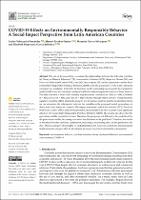| dc.contributor.author | Valenzuela-Fernández, Leslier | |
| dc.contributor.author | Escobar-Farfán, Manuel | |
| dc.contributor.author | Guerra-Velásquez, Mauricio | |
| dc.contributor.author | García-Salirrosas, Elizabeth Emperatriz | |
| dc.date.accessioned | 2023-11-07T14:22:17Z | |
| dc.date.available | 2023-11-07T14:22:17Z | |
| dc.date.issued | 2023-02 | |
| dc.identifier.uri | https://hdl.handle.net/20.500.13067/2762 | |
| dc.description.abstract | The aim of the research is to examine the relationships between the following variables (a) Theory of Planned Behavior (TPB), composed of Attitudes (ATT), Subjective Norms (SN), and Perceived Behavioral Control (PBC); and (b) Consciousness (EC) on the dependent variable Environmentally Responsible Purchase Intention (ERPI) from the perspective of the Latin American consumer in a pandemic. Currently, the literature on the relationships proposed in the explanatory model is still scarce at a theoretical and practical level, without empirical evidence in Latin America. The data collection is from 1624 voluntary responses from consumers in Chile (n = 400), Colombia (n = 421), Mexico (n = 401), and Peru (n = 402) collected through online surveys. Using structural equation modeling (SEM) and multi-group to test invariance analysis and the moderating effects, we can determine the relationship between the variables in the proposed model, generating evidence from Latin American countries. The empirical analysis verified that Attitude (ATT), Perceived Behavioral Control (PBC), and Environmental Consciousness (CE) have a positive and significant effect on Environmentally Responsible Purchase Intention (ERPI). The results also show that the generation variable presents invariance. Therefore, the groups are not different at the model level for the generation variable, becoming relevant to the difference at the path level. Therefore, the results of this study become a relevant contribution, indicating a moderating effect on the generation variable. This research provides insights for understanding Latin American consumers, and managerial implications are also provided for developing strategies to promote sustainable consumption. | es_PE |
| dc.format | application/pdf | es_PE |
| dc.language.iso | eng | es_PE |
| dc.publisher | MDPI | es_PE |
| dc.rights | info:eu-repo/semantics/openAccess | es_PE |
| dc.rights.uri | https://creativecommons.org/licenses/by/4.0/ | es_PE |
| dc.subject | Environmental behavior | es_PE |
| dc.subject | Purchase intention | es_PE |
| dc.subject | Theory of planned behavior | es_PE |
| dc.subject | Environmental consciousness | es_PE |
| dc.subject | COVID-19 | es_PE |
| dc.title | COVID-19 Effects on Environmentally Responsible Behavior: A Social Impact Perspective from Latin American Countries | es_PE |
| dc.type | info:eu-repo/semantics/article | es_PE |
| dc.identifier.journal | International Journal of Environmental Research and Public Health. 2023 | es_PE |
| dc.identifier.doi | https://doi.org/10.3390/ijerph20043330 | |
| dc.subject.ocde | https://purl.org/pe-repo/ocde/ford#5.02.04 | es_PE |
| dc.source.volume | 20 | es_PE |
| dc.source.issue | 4 | es_PE |
| dc.source.beginpage | 3330 | es_PE |


